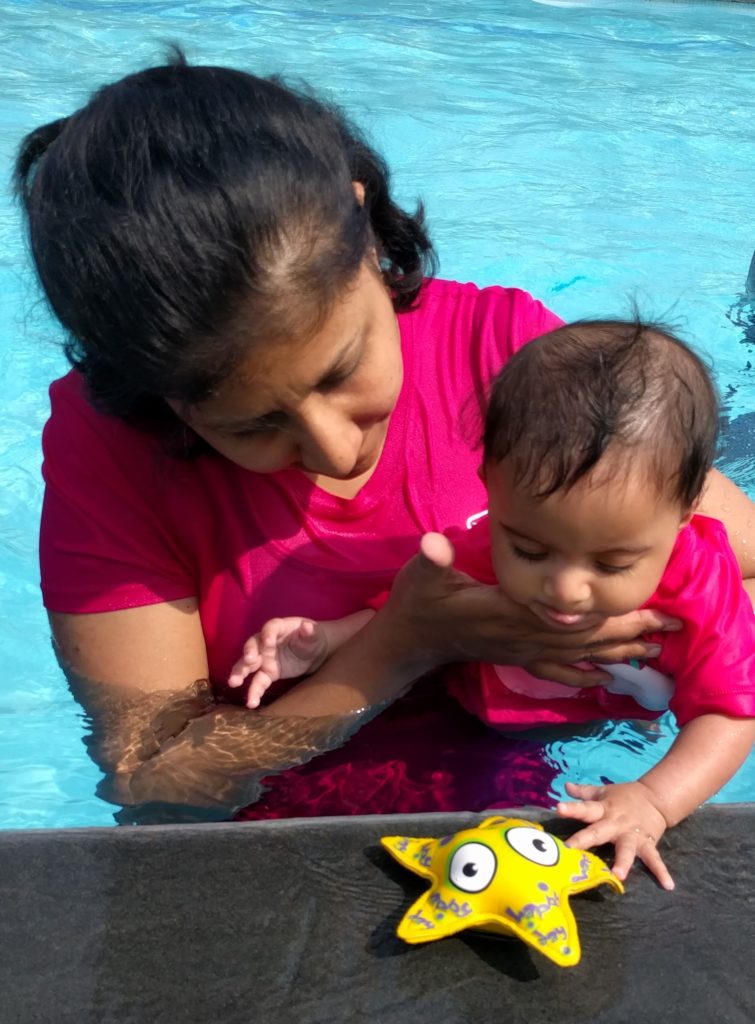
[Munazza Habibulla is the Business Head at Swimming Matters. Pushed off the diving board at the deep end in her first learn to swim class as a child, she developed a fear of water that lasted through her growing up years. As an adult, she realized this fear stopped her from engaging with water and enjoying water based activities, and grew to appreciate swimming and water safety as a fundamental life skill. Now as a mother of a three year old, Munazza, through her work at Swimming Matters, wants to ensure that her child and others like her learn to engage with water safely, correctly and for life!]
As responsible parents, we teach our children math and manners and mother tongue; for their habits we tell them to drink milk and sleep early; for their talents we teach them music and dance; for their sports we teach them cycling and cricket; and for their safety we encourage car seats and self defence. But what often goes missing in this list is an essential life skill: Swimming and encouraging them to learn to swim. For too many Indian parents, safety in, on and near water is not on the list and that’s something we need to change.
In Geography class we have all marveled at the beauty of our blue planet, and been awed by the fact that our Earth is 70% water. If it is, like the proverb goes – “water, water everywhere” – should we not make friends with it? I know it is not an easy ask. For many, staying safe around water means keeping kids away from water. The fears are many: What if my child catches a cold or an infection? What if my child’s hair gets damaged or the skin gets tanned? Amidst these concerns, parents forget to acknowledge and appreciate that water safety and swimming are basic life skills that keep our children safe and healthy.
Here’s why I believe swimming is an important life skill that we should teach all children:
Life-Saving skill
The most important reason we should know swimming is for our personal safety and the safety of our loved ones. It’s the one sport that has the potential to be a true life saver. Fatal drowning is the leading cause of preventable deaths after road accidents in India. As per the National Crime Records Bureau statistics, 80 people drown every day. Our children are the most vulnerable – most victims of drowning are children and young adults. This is preventable, if only each one of us know – and teach our children – swimming and water safety correctly.
Health benefits
Swimming is a great exercise to build endurance, muscle strength and cardiovascular fitness. It helps one maintain a healthy weight, healthy heart and lungs. It provides an all-over body workout, as nearly all of your muscles are used during swimming.
Recreation activity
Swimming is a fun recreational activity for people of all ages, skills and fitness levels. It’s a good way to relax, feel good and frolic in the water with family and friends. Not to mention, a pleasant way to beat the summer heat!
Good for kids
There are many social, physiological and psychological benefits for children during their growing up years. It improves coordination, balance, posture and flexibility, alleviates stress and helps in their physical development during their childhood and adolescent years. It’s also a lot of fun and helps them make friends too!
Foundation for other water based activities
There is a massive world out there to explore in water based activities, like surfing, rowing, sailing, canoeing, scuba diving, snorkeling etc., and one can engage better if they know swimming and water safety. Even a trip to your local water park can become a whole lot of fun if you know how to engage with water safely and correctly.
Career prospects
That’s an odd one, isn’t it? But it is true. Knowing swimming and water safety can open up many new career options like aqua fitness instructor, hydro therapist, marine biologist, scuba diving instructor, underwater photographer, and the most satisfying of it all – a Swim Teacher!
Preparing for future
Amidst the growing threat of climate change and global warming, natural calamities will be a reality our children may have to reckon with. A recent news report suggested the floods in Kerala last year led to many middle-aged people signing up for swimming lessons in the State. Knowing swimming and water safety can be an asset in the eventuality of floods and other natural calamities.
